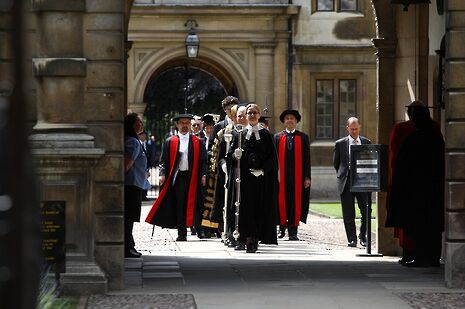Cambridge MA award under threat from MPs
MPs are proposing an end to the automatic upgrade from BA to MA for graduates from the Universities of Oxford and Cambridge

‘Complimentary’ Masters degrees should no longer be awarded to graduates from the Universities of Cambridge and Oxford just because they are Britain’s oldest educational establishments, MPs argue.
The cross-party group of ministers will present their ten-minute bill in Parliament today (Tuesday), claiming there is “no logical or justifiable defence of this historical anachronism” and that the long-standing tradition should be terminated “in order to preserve the academic integrity of the MA”.
Currently, students with a bachelor’s degree from the University of Cambridge can upgrade to a Master of Arts (MA) title six years after their first term of study. At other universities, at least one extra year of study is required, paying tuition fees that average £4,250.
Politicians are now hoping to ban this ‘Oxbridge MA’ for good, since they believe it gives students an unfair advantage in the jobs market. More than 60 per cent of employers were unaware that a Cambridge MA is of an honorary nature, according to a study in 2000 by the universities watchdog, the Quality Assurance Agency (QAA).
Chris Leslie, Labour MP for Nottingham East, who is leading the campaign, described the ‘Oxbridge MA’ as “an out-dated and unfair practice.”
“It is unbelievable that the practice still goes on…we need to end this unmerited and confusing patronage once and for all,” he added.
However, there is some confusion underlying their campaign: the ‘MA’ awarded to Oxford and Cambridge students historically was not meant to be a higher degree and was simply a title, but has now been equated to the MA degree of other universities.
The MA of Cambridge and Oxford stems from the Middle Ages, and was merely a title that signified that the student had become a full member of the university, qualified to teach and to vote in discussions of the house of Convocation.
It was only in the mid-19th Century that the title MA had any connotations of a higher qualification, when the University of London moved away from the traditional system and set up an MA that was a more advanced award, distinct from the initial degree.
The Universities of Oxford and Cambridge, therefore, are not automatically awarding their students with a higher MA degree, but are simply granting them the traditional title.
“This debate stems merely from ignorance about the education system at Oxbridge, and I suspect jealousy on some people’s parts,” commented an Oxford graduate on the Daily Telegraph’s website. “I do not believe that our traditions should be under threat merely due to a group of MPs who clearly have a chip on their shoulder for not being accepted into Oxbridge in the first place.”
Despite this, even academic staff have been questioning the tradition. Speaking at Cambridge University’s Senate last year, Dr Neil Dodgson, a Computing Professor, said: “Many find it offensive that we should award a degree for doing nothing more than being able to breathe for three years. It is only a matter of time before our MA spawns a PR disaster.”
He added: “Perhaps it is time for us to acknowledge that the rest of the world has moved on, and to align ourselves, reluctantly, with a world that believes that a degree should only be awarded for academic achievement.”
Mr Leslie admitted that this “may not be the top priority for reform in higher education”, but is determined to convince Parliament today that this will be the last year for the “free MA”.
 News / Cambridge academics stand out in King’s 2026 Honours List2 January 2026
News / Cambridge academics stand out in King’s 2026 Honours List2 January 2026 Interviews / You don’t need to peak at Cambridge, says Robin Harding31 December 2025
Interviews / You don’t need to peak at Cambridge, says Robin Harding31 December 2025 Comment / What happened to men at Cambridge?31 December 2025
Comment / What happened to men at Cambridge?31 December 2025 Features / “It’s a momentary expression of rage”: reforming democracy from Cambridge4 January 2026
Features / “It’s a momentary expression of rage”: reforming democracy from Cambridge4 January 2026 News / Varsity’s biggest stories of 202531 December 2025
News / Varsity’s biggest stories of 202531 December 2025









